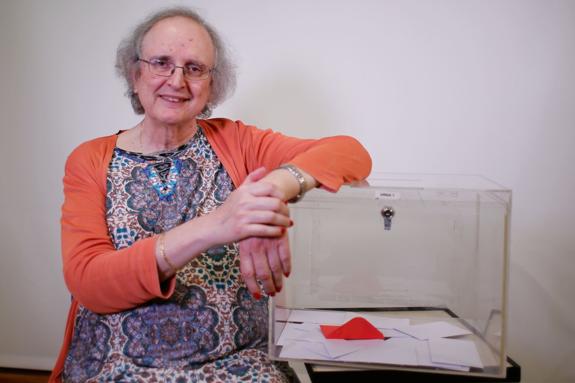'Only reality could save me, even if the world caved in'
Granada-born activist Kim Pérez, who was the first transgender person to stand for election in Spain, talks to SUR in English about how her time in seventies London opened her eyes to her own reality: "Little by little, I started my transition. I felt happier, safe and calm"
ALEKK M. SAANDERS
Miércoles, 31 de marzo 2021, 18:23
The first International Transgender Day of Visibility was held on 31 March 2009 in order to celebrate transgender people and raise awareness of discrimination. Granada-born Kim Pérez is one of the most recognised activists for the rights of transgender people in Spain. She was the first transgender person to stand for election in this country.
This year, 2021, is significant for this prominent LGBTQ activist in Andalucía for three reasons: she celebrates her 80th birthday; it is 30 years since she came out as a transsexual; and 50 years since she went to England, a place that gave her a new hope and joy of life.
At the age of 28, Kim was already a non-tenured lecturer in Medieval History at the University of Granada. Everything seemed to be going well for the young person, except the secret that no one could know.
A lot changed during a holiday in England, a place she had regarded as the most cosmopolitan and liberal country in Europe.
"I finished my thesis in 1971, and that Christmas I decided to go on vacation to London. At that time I had a lot of inner tensions. One of them was the realisation that my height, 1.85cm, would prevent me from living and dressing as a woman. But, as soon as I got off the plane, I saw two young women in front of me, who were my height. In less than a second, I decided that I would stay in London."
Crossing the bridge over the Thames, Kim decided to burn her bridges with Spain to be herself at last. She called the head professor of her department at the University in Granada and said goodbye to him.
"In London I immediately found a job through an association that helped foreign students with work. I was already a teacher, but young, hence flexible, and I could integrate well. My first job was as a kitchen assistant. My first home in England was a good, old but comfortable room with excellent heating," she told SUR in English.
The cold atmosphere in England needed the warmth of friendship. Kim had realised it would be difficult to make friends with only her Spanish and perfect French, but she found more understanding in an Anglican parish that gave a place to transvestites. In the Catholic church during the Franco dictatorship, such freedom was unimaginable.
"I remember my first visit to the parish. That night I saw a very beautiful Asian; someone who came dressed in a suit and tie and brought a suitcase to change clothes; and the person running the meeting - very tall and thin like me - wore a long purple robe and had a short black bob. She gave explanations that I could not understand or answer and I couldn't say a word.
"The following week I went back and met someone who was anxiously staggering in unusually high heels and dressed in an inappropriate miniskirt, the typical signs of a first outing. But then no one opened the door," she explains.
Kim walked around London a lot to observe the life of the British capital with its open-mindedness that was more expressive at that moment - two years after the Stonewall riots in the streets of New York. The streets of London helped the Andalusian guest discover more of the spectrum of transsexuality. Kim remembers noticing a bearded person in a woman's dress. They seemed not to care at all about the definition of being male or female.
However these strides in sexual liberty, she said, showed to what extent this country was the right place for her and made her wonder whether she was prepared for it.
For a long time, in Great Britain sex had been something not talked about, but at the beginning of the 70s that started to change. When Kim was in London it appeared the capital was in an explosion of sexual imagery though, for her, transsexuality was more about identity than about sex.
Kim explains how when she had been in London for a month, a sexual slogan on a plastic apron outside a souvenir shop in Carnaby Street made her stop and think. "It hit me like lightning... I was convinced that my current persona was the best I could hope for. I understood that I was obsessed with myself and that in the real world there were continual misfortunes to which I was oblivious.
"A week later, while on board HMS Belfast, a cruiser from the World War II anchored in Thames, I was reminded of my father's military heroism, and I was ashamed. So, looking at the cold, black waters of the river, I determined from that moment on, to renounce my feelings, to live as if they did not exist," she added.
Looking back she knows she was making a mistake, but then she didn't realise that those feelings could be channelled, but not repressed.
Kim interrupted her stay in the English capital and went back to her life in Spain, working as a teacher at a secondary school, a job she did as a man for two decades.
"I started twenty years of self-repression, so prevalent among trans women. It was an emotionally empty life," she recalls. But those feelings from the London experience returned, and became distressing again. "I had only let them live in my fantasies."
In 1991, Kim turned 50 and understood that "only reality could save me, even if the world caves in". By that time the situation in Spain was different. "I knew how to act prudently. The world indeed did not cave in. Little by little, I started my transition. I felt happier, safe and calm," she adds.
She was able to keep her job as a teacher of Ethics and Philosophy, and retired in 2006.
Kim Pérez was not petrified anymore. Gaining personal strength helped her appear on different Spanish TV channels, and face people with possible misunderstanding and inconvenient questions.
After coming out in 1991, she involved herself in the issue of transsexuality. She founded the Association of Gender Identity in Andalucía.
Thanks to her activity, in 1999, Andalucía became the first autonomous community in Spain to include treatment and gender reassignment surgeries in its catalogue of health benefits.
In 2007, Kim stood in municipal elections for the city of Granada on the list of the Izquierda Unida party.
Now she continues her activity in raising awareness and increase visibility of transgender people.
In 2017, Granada city council recognised her contribution in the struggle for respect and equality of gender identity with the Gold Medal for Merit.



